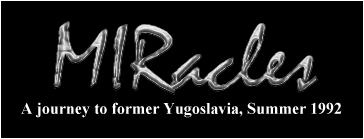

In 1992, I went to former Yugoslavia, at the height of ethnic cleansing, to experiment with a new way of reporting the news, via the InterNet, one that was free of the usual failings of the mainstream media. I sought to set my own direction as I traveled in all the former Yugoslav Republics except Bosnia and Montenegro, talking to people, visiting forgotten scenes of devastation, and exposing previously unknown human needs brought on by the crisis. In 1994, after travelling many thousands of miles telling about what I saw, my health gave and I was forced to retire from nearly all anti-war activism to pursue less stressful investigations.
I find war to be vulgar and unnecessary. In some ways, I feel elements of the Peace Movement to share in the responsibility for this war, for sitting down and declaring that maybe, at long last, they had found a cause which truly did merit military intervention. I feel that there was, at the time of my retirement, insufficient effort being made to have dialogue with the Serbs and a tendency on the part of local activists to treat this war as a kind of sideshow. I feel that there was insufficient understanding of the reasons for the atrocity in Bosnia as there is now for what is happening in Kosovo and a tendency to brush off the arms trade as a "given" which did not merit further investigation.
Today, I find that I cannot call most of the opposition to this war my allies. I cannot stand with those Serbs who wave the flag and call for the bombing to stop because they feel the invasion of Kosovo to a justifiable response to an internal matter. I cannot stand with conservatives who hate this war because they hate everything Clinton does, because thirty years ago he chose to listen to his conscience and make public his opposition to the Vietnam War. I do not trust those other nationalities of former Yugoslavia who had jeered on the sidelines and provoked the situation in Kosovo. The real pacifist, I have come to conclude, has few real friends in any war. I cannot stand with peace activists whose response is weak-kneed and predictable, either.
Dialogue with the Serbian people and optimistic support for Serbian opposition movements could have, I believe, prevented this showdown. The embargo and bombing of Yugoslavia, I believe, has only intensified the jinjoism of the nation. The average Serb thinks "It is Us Against the World". And so they fight on, because fighting is the only face-saving option which the United Nations and NATO have allowed it.
We cannot trust the media to give us the news about internal matters in Serbia. They act as if democratic opposition to Milosevic does not exist. I know otherwise. Among the cities bombed in the NATO Air Strikes was Pancevo, where existed, in 1992, a thriving peace movement. Vojvodina, which has seen at least two air strikes on Novi Sad and Pancevo, was home to other movements of indigenous Magyars, Croats, Romanians, and Serbs who refused to fight outside the national territory against secessionist states. These men and women will be hard-pressed in these times of direct assault against their country to resist the pressures undoubtably being dropped on them by a panicked nation.
Pacifists must be vigilant and thoughtful as they propose solutions to the crisis. Both sides have contributed to the situation. The United States and NATO, being the more powerful of the two antagonists, can inflict suffering without injury to itself, much as Serbia inflicted suffering on the Bosnians a few years ago. We must not mistake relative power or weakness for moral superiority. This is the message which I give to Friends and others who struggle in their hearts to understand and present an effective witness to this war. We must seek to address the roots of war, not merely those in the hearts of the combatants, but also those that lay in the profit motive and the willingness of some to provide arms for the warmakers.